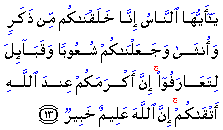Universal Brotherhood, Satan the third, Time is not Money
Issue 288 » August 20, 2004 - Rajab 4, 1425
General
| Living the Quran |
Al-Hujurat
(The Dwellings)
There are several principles, which this verse presents:
Source: |
| Understanding the Prophet's Life |
| Satan the third one The Prophet, peace and blessings be upon him, is reported to have stated that “whenever two strangers of the opposite gender are alone with each other, Satan becomes the third one between them.” (At-Tirmidhi)” Muslims should have good relations with all people, males as well as females, at school, at work, in our neighbourhood etc. We should be kind and courteous to everyone. However, it is not allowed in Islam to take a non-mahram person or persons of the opposite gender as a very close friend. Such friendship often leads to haram. It is not allowed for a Muslim boy to have a girlfriend or for a Muslim girl to have a boyfriend. Howsoever pure our intentions may be, the danger is that it will lead us to sin. Or at least we will be alone with each other and spend more time together. Thus, we should be friendly with your classmates, boys and girls both; but a boy should not take a girl as his intimate friend or vice versa. Of course, homosexuality is also forbidden in Islam. Source: |
| Blindspot |
Time Is Not MoneyIslam encourages Muslims to care for time, to utilize it and not to waste it. It holds them responsible for their time. The righteous predecessors were aware of that responsibility, so they acted accordingly. Describing their care for time, Hassan Al-Basri said, "I saw those people and how they were more careful about their time than about their Dirhams and Dinars [i.e. their money]." An important requirement for a Muslim's life is to be careful about time, to invest it wisely and to benefit from it. In this regard, Ibn-ul Qayyim says, "The highest, most worthy and most useful of reflection is what is intended for Allah and the Hereafter. There are various forms of reflection intended for Allah. One of them is reflecting on time duty and function and focusing entirely on it, for the knowledgeable one is the breed of his time. If he wastes it, all his interests are wasted, for all interests arise from time. If he wastes his time, he can never regain it." As expressed by Imam Hassan Al-Banna, "Time is life itself." This reflects Ibn Qayyim Al-Jawziyyah's saying: "One's time is in fact his age. It is the material of his eternal life either in everlasting joy or painful torture. It passes more quickly than clouds do. It is only the time one dedicates to Allah that constitutes one's real life and age. The rest does not count; the life he leads in it is only animal life. Compared to a life of indulgence in appetitive activities, false aspirations and negligence of Allah's remembrance - and at best in sleep and being idle - death is a much better alternative." The sad and painful thing about us now is that "our nation has been improvising ways of wasting time at the public and the private levels. As a result, the world is already proceeding to the future without us, as if we were the 'orphans of history'. If such improvisation is not directed to investing and utilizing our time properly, the gap between us and the future will widen further, and we will remain importers and consumers of cultural products. Eventually, our survival will be entirely dependent on the producers of those products." [Khuldun Al-Ahdab, "Reflections on the Value of Time"] Therefore, Muslims must unite their efforts to identify weaknesses for treatment, and must give time its due attention as demanded by Islam. The following are some of the most important duties demanded of Muslims:
Source: |
